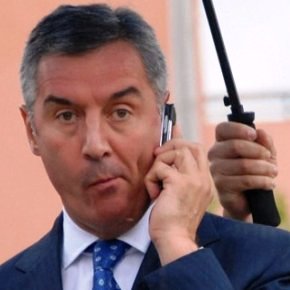 (Podgorica, 19 March 2013) – The government’s preferred scenario for resolving the crisis at the Podgorica Aluminum Combine (KAP) – most recently promoted by Prime Minister Milo Djukanovic – represents an eventual betrayal of Montenegro’s economic interests. It will likely result in the further rebalancing of the state budget in order to secure the displacement of the Russian owners’ debts onto the shoulders of the country’s citizens.
(Podgorica, 19 March 2013) – The government’s preferred scenario for resolving the crisis at the Podgorica Aluminum Combine (KAP) – most recently promoted by Prime Minister Milo Djukanovic – represents an eventual betrayal of Montenegro’s economic interests. It will likely result in the further rebalancing of the state budget in order to secure the displacement of the Russian owners’ debts onto the shoulders of the country’s citizens.
Since the initial privatization to this very day, the sustainability of KAP was based on the premise that Montenegro’s citizens would effectively finance the Russian owners’ profits, including underwriting any credits to linked companies and other debts that CEAC isn’t returning, not to mention the waver of taxes and contributions, as well as subsidized electricity prices for KAP, and including direct state subsidies worth tens of millions of euros. As a result, the current plan is again premised on the idea that the citizens will pay the price of the government’s misguided policies.
This is the solution that Djukanovic is now promoting as the best option for KAP, claiming there is no better alternative. His position seems unchanged from the privatization seven years ago, when he claimed that the sale of KAP to an offshore company under such conditions was also the best solution for this factory and for the whole of Montenegro. Time has proven not only that Djukanovic was wrong about the initial privatization, but that the sale of KAP was conceived in such a way to lay the risk of such a deal on the shoulders of Montenegro’s citizens.
The price of this policy is reflected in the fact that citizens are now paying the most expensive electricity costs in the region, as well as the infamous “euro by euro” tax (attempting to plug holes in the budget resulting from the activation of the state’s loan guarantees to KAP’s creditors). New taxes, levies and further electricity price hikes are certain by the end of the year if Montenegro takes on KAP’s electricity debts (as the government plans to do).
Of course, a scenario exists that in no way suits Djukanovic and the Russian tycoons whose interests he is protecting. This scenario would involve a full investigation into KAP’s operations since the privatization, which would uncover the scams used to extract capital from the factory with state assistance. Such an investigation would also reveal the actual scope of debts burdening KAP today. Such a course of action would not suit Djukanovic because it would pose the question of accountability for the conclusion of a series of agreements that were damaging for Montenegro (beginning with the privatization agreement itself, not to mention the electricity subsidies that were agreed upon, as well as the recent and current negotiations with CEAC about state-guaranteed debt wavers and the possible denationalization of the factory).
If Montenegro was a state of law, Djukanovic would only be able to discuss KAP before a state prosecutor, since he is the most responsible individual for the conditions in which the company now finds itself in. Instead of a trial, however, this individual still believes that he has the best solution for KAP.
Before Djukanovic is able to implement his ‘solution,’ which is synonymous with putting his hands even deeper into the pockets of Montenegro’s citizens, the public should be told how KAP’s debts were incurred and where the hundreds of millions of euros ostensibly invested in the factory actually ended up. It would be useful to hear who allowed KAP’s electricity debt to surpass €60-million, while the Electric Power Company of Montenegro (EPCG) has nevertheless continued to illegally and without any agreement supply it with electricity. It would also be good to know who allowed the EPCG to be trapped within such a problematic arrangement.
How was all this possible when Milo Djukanovic’s government has declared that it “will not foster the sentiment that something can be consumed without paying for it”?
Djukanovic has stated that the “burden of transition must be borne by all of us equally,” however the actual burden till now has only been carried by citizens. Djukanovic’s “best solution” is actually to ensure that his tycoons pay for KAP through a tax on their surplus profits.
The pressure on citizens is becoming increasingly untenable, while the justifications of the government are an insult to the intelligence of citizens and are testing the limits of the biological survival of an increase share of the population. The core of the problem with KAP is corruption at the highest level. Until this problem is resolved and those most responsible for this state of affairs are placed behind bars, Montenegro’s economy will remain captured by the interests of foreign tycoons and their domestic assistants.



